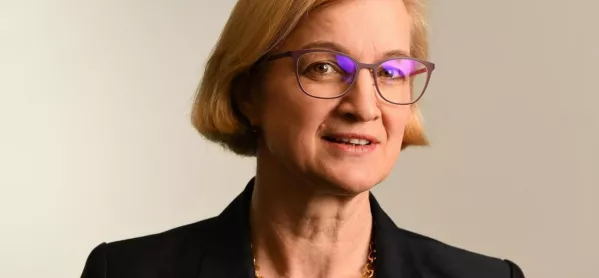Ofsted: Covid ‘fractured schools’ contract with parents’

Ofsted chief inspector Amanda Spielman has told headteachers that Covid disruption “fractured the social contract” around education and the need for pupils to be in school.
In a speech to the Association of School and College Leaders (ASCL) this morning, she told heads that “now is the time to remake the contract” to improve attendance.
Ms Spielman also told heads that Ofsted had done its best to “put fair play at the heart of the game” as it returned to full inspections.
The Ofsted chief inspector was followed as a speaker at the ASCL conference by Labour’s shadow education secretary, Bridget Phillipson, who said that teachers and headteachers are too often feeling “punished” by the watchdog’s inspections.
Ms Phillipson called on Ofsted to “turn a corner” and, speaking after her speech, she said that she wanted to look at the way Ofsted grades are considered, and questioned how well parents understood them.
Ofsted: The need to improve school attendance
Ms Spielman told heads that the disruption of the past two years of the coronavirus pandemic had “fractured the social contract” around education.
“For years, that contract has been clear: parents have a responsibility to get their children to school, with minimum absences, and, in return, schools do their level best to educate and look after those children,” she said.
She added that it was now time to “remake that contract”, with Ofsted’s research showing that schools with strong attendance strategies “unsurprisingly” proved more adept at ensuring that pupils came into school during the pandemic.
The head of Ofsted also told headteachers not to run mock inspections because these are a “waste of precious time”.
The chief inspector said she was “acutely aware” of teacher workload and wellbeing issues, which had been “thrown into sharp relief by the pandemic”.
“So please, don’t overload your teams with preparatory work “for Ofsted”. Just don’t do it,” she said.
Ms Spielman also told heads that the inspectorate had just restarted its summary evaluations of multi-academy trusts, but added: “What we’re not doing is grading or judging MATs, or trying to impose a model for the way trusts should work.”
Labour calls for Ofsted to change
In her speech to the ASCL conference, Ms Phillipson called for MATs to be inspected directly by Ofsted - something Ms Spielman has voiced support for previously.
Ms Phillipson added that Ofsted operates “in a way that is often too high-stakes, and where the risks of a bad inspection outweigh the rewards of a good one”.
She said: “A cat and mouse game between inspectors and schools, with no incentive to have an honest professional dialogue, to accept weakness and work to address it, are the unhelpful features of such an adversarial system.”
Labour’s shadow education secretary said the fact that 85 per cent of schools are “good” or “outstanding”, in Ofsted terms, was “testimony to the hard work of school leaders and teachers across the country over these last three decades”.
But she added: “Let me be clear. Labour believes that inspection has been part of that success.
“An independent schools inspectorate, with chief inspectors not beholden to ministers, unafraid to speak their minds, is a sign of a mature and confident education system.
“But to be supportive of Ofsted’s role is not to believe it cannot be better. For one thing, it is hardly surprising if the Ofsted we need tomorrow is different from the Ofsted we needed 30 years ago.”
In a briefing after her speech, she was asked whether Labour would keep the four inspection grades for schools that Ofsted currently uses.
She said: “I want to look at the way in which grading is considered and what parents might learn from the report and from what schools are doing well.
“But also a greater focus on making sure our children’s wellbeing and mental health is supported as well, and that is of increasing importance to parents coming out of the pandemic.
“And I feel like there is a stronger role there in capturing in a much bigger way what schools are getting right.
“I don’t think parents looking at those grades would always have a clear sense as to what they mean in reality.”
You need a Tes subscription to read this article
Subscribe now to read this article and get other subscriber-only content:
- Unlimited access to all Tes magazine content
- Exclusive subscriber-only stories
- Award-winning email newsletters
Already a subscriber? Log in
You need a subscription to read this article
Subscribe now to read this article and get other subscriber-only content, including:
- Unlimited access to all Tes magazine content
- Exclusive subscriber-only stories
- Award-winning email newsletters
topics in this article



